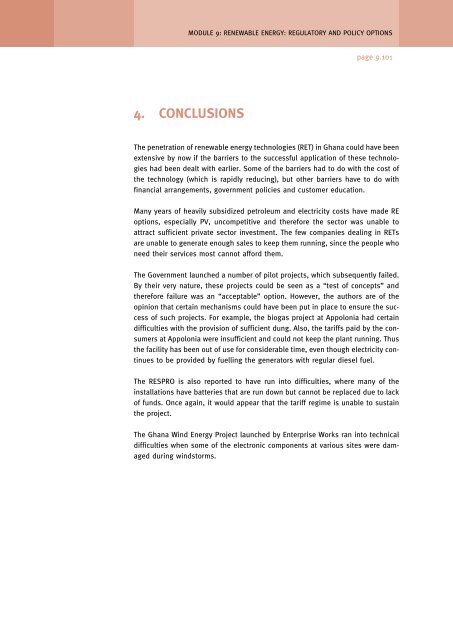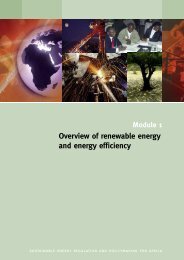Regulatory and policy options to encourage development of ...
Regulatory and policy options to encourage development of ...
Regulatory and policy options to encourage development of ...
- No tags were found...
You also want an ePaper? Increase the reach of your titles
YUMPU automatically turns print PDFs into web optimized ePapers that Google loves.
MODULE 9: RENEWABLE ENERGY: REGULATORY AND POLICY OPTIONSpage 9.1014. CONCLUSIONSThe penetration <strong>of</strong> renewable energy technologies (RET) in Ghana could have beenextensive by now if the barriers <strong>to</strong> the successful application <strong>of</strong> these technologieshad been dealt with earlier. Some <strong>of</strong> the barriers had <strong>to</strong> do with the cost <strong>of</strong>the technology (which is rapidly reducing), but other barriers have <strong>to</strong> do withfinancial arrangements, government policies <strong>and</strong> cus<strong>to</strong>mer education.Many years <strong>of</strong> heavily subsidized petroleum <strong>and</strong> electricity costs have made RE<strong>options</strong>, especially PV, uncompetitive <strong>and</strong> therefore the sec<strong>to</strong>r was unable <strong>to</strong>attract sufficient private sec<strong>to</strong>r investment. The few companies dealing in RETsare unable <strong>to</strong> generate enough sales <strong>to</strong> keep them running, since the people whoneed their services most cannot afford them.The Government launched a number <strong>of</strong> pilot projects, which subsequently failed.By their very nature, these projects could be seen as a “test <strong>of</strong> concepts” <strong>and</strong>therefore failure was an “acceptable” option. However, the authors are <strong>of</strong> theopinion that certain mechanisms could have been put in place <strong>to</strong> ensure the success<strong>of</strong> such projects. For example, the biogas project at Appolonia had certaindifficulties with the provision <strong>of</strong> sufficient dung. Also, the tariffs paid by the consumersat Appolonia were insufficient <strong>and</strong> could not keep the plant running. Thusthe facility has been out <strong>of</strong> use for considerable time, even though electricity continues<strong>to</strong> be provided by fuelling the genera<strong>to</strong>rs with regular diesel fuel.The RESPRO is also reported <strong>to</strong> have run in<strong>to</strong> difficulties, where many <strong>of</strong> theinstallations have batteries that are run down but cannot be replaced due <strong>to</strong> lack<strong>of</strong> funds. Once again, it would appear that the tariff regime is unable <strong>to</strong> sustainthe project.The Ghana Wind Energy Project launched by Enterprise Works ran in<strong>to</strong> technicaldifficulties when some <strong>of</strong> the electronic components at various sites were damagedduring winds<strong>to</strong>rms.










